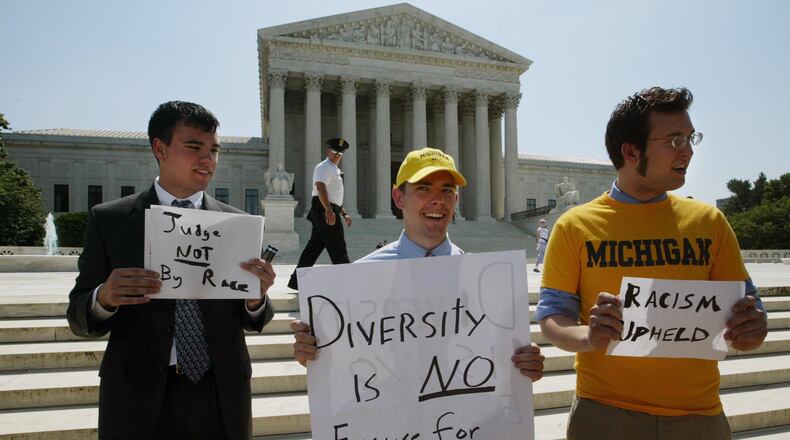The Wall Street Journal and New York Times report today the Trump White House plans to rescind Obama administration policies designed to foster greater racial diversity on America’s college campuses.
The news was not a surprise as newly confirmed Assistant Secretary for Civil Rights Ken Marcus is not a proponent of race-conscious college admissions.
The reversal of federal admissions guidelines reflects a general retreat by the administration from policies that pressure schools to scrutinize their practices through a lens of racial bias. For example, the U.S. Department of Education said last week it would push back the imposition of an Obama-era rule mandating states review how districts identify and serve minority students with disabilities for two years.
The "Equity in IDEA" rule was due to go into effect this fall and came in response to findings that minority students in special education were disproportionately disciplined and placed in more restrictive settings.
As ProPublica reported on June 21:
We found that, under Secretary of Education Betsy DeVos, the department has scuttled more than 1,200 civil rights investigations that were begun under the Obama administration and lasted at least six months. These cases, which investigated complaints of civil rights violations ranging from discriminatory discipline to sexual violence in school districts and colleges around the country, were closed without any findings of wrongdoing or corrective action, often due to insufficient evidence.
Today, The New York Times reports:
The Trump administration will encourage the nation's school superintendents and college presidents to adopt race-blind admissions standards, abandoning an Obama administration policy that called on universities to consider race as a factor in diversifying their campuses, Trump administration officials said...As part of that process, the Justice Department rescinded seven policy guidances from the Education Department's civil rights division on Tuesday.
The Supreme Court has steadily narrowed the ways that schools can consider race when trying to diversify their student bodies. But it has not banned the practice. Now, affirmative action is at a crossroads. The Trump administration is moving against any use of race as a measurement of diversity in education. And the retirement of Justice Anthony M. Kennedy at the end of this month will leave the court without its swing vote on affirmative action and allow President Trump to nominate a justice opposed to a policy that for decades has tried to integrate elite educational institutions.
Reaction was swift.
“While I am not surprised, I continue to be disappointed that the President of this great country demonstrably cares so little for its non-white residents and their interests,” said Louisiana Congressman Cedric L. Richmond, chairman of the Congressional Black Caucus.
“The reported actions come as the Department of Justice appears ready to tee up a challenge to lawful race conscious admissions or affirmative action programs. Diverse campuses play an integral part in how our students collaborate and thrive. Although today’s action does not change any laws, it sends a clear signal that Attorney General Sessions and Secretary DeVos are advancing a vision of America that is particularly hostile to students of color, but that will impact all students,” said Vanita Gupta, president and CEO of the Leadership Conference on Civil and Human Rights.
(Georgia public colleges already do not consider race in admissions. Read why here.)
Many readers of this blog endorse the elimination of race as one of the factors that colleges weigh. Yet, they don’t seem to object to athletic ability as a factor in admissions, especially for their favorite college team.
As the AJC reported, the 2014 freshman class at Georgia Tech had an average SAT score of 1445. However, for incoming football players, the average SAT was 420 points below the class as a whole. Gaps were also found among athletes at the University of Georgia, Georgia State and Georgia Southern. The AJC reported that in some years, as many as 100 percent of football players have SAT scores in the bottom quarter of their freshman class at Tech. At the University of Georgia, the AJC found about eight of 10 football players were in the bottom quarter.
But no one in the Georgia Legislature, the U.S. Congress or the White House is speaking out against affirmative action for football players. Nor are any elected officials or millionaire congress members arguing against the admissions edge sometimes accorded legacies or the children of influential lawmakers and big donors.
Those insisting college acceptances be blind to any factors outside student performance would likely not welcome the result – campuses that are overwhelmingly women. Girls are outperforming boys across the country, which is why 58 percent of students on college campuses are women.
Admissions directors bypass more qualified females to admit enough males to keep the campus somewhat balanced as neither young women nor young men want to attend a school that is nearly all women. As Richard Whitmire, author of "Why Boys Fail," wrote in a column seven months ago:
When it comes to college, middle-class and upper-middle-class parents with underperforming sons get a break that helps disguise these gaps. Many colleges, desperate to recruit more men, are more than willing to admit less-qualified males. The takeaway for parents: If you've got the tuition money, you'll find a spot for your son somewhere.
Colleges seek out running backs, math scholars, tuba players, ballet dancers and nice kids willing to organize dorm Halloween parties. They search out students with an array of backgrounds and talents. The admissions process is designed to produce a well-rounded class of students whose interests and backgrounds are not identical. And that’s a worthwhile goal for campuses and students.
I recently talked to a Walton High School grad who turned down a prestigious University of Georgia scholarship to go to an urban campus in the northeast. She told me, “I thought UGA would just be Walton on a bigger scale. I wanted to meet people who were different than the ones I went to school with since first grade.”
Your thoughts?
About the Author
Keep Reading
The Latest
Featured



